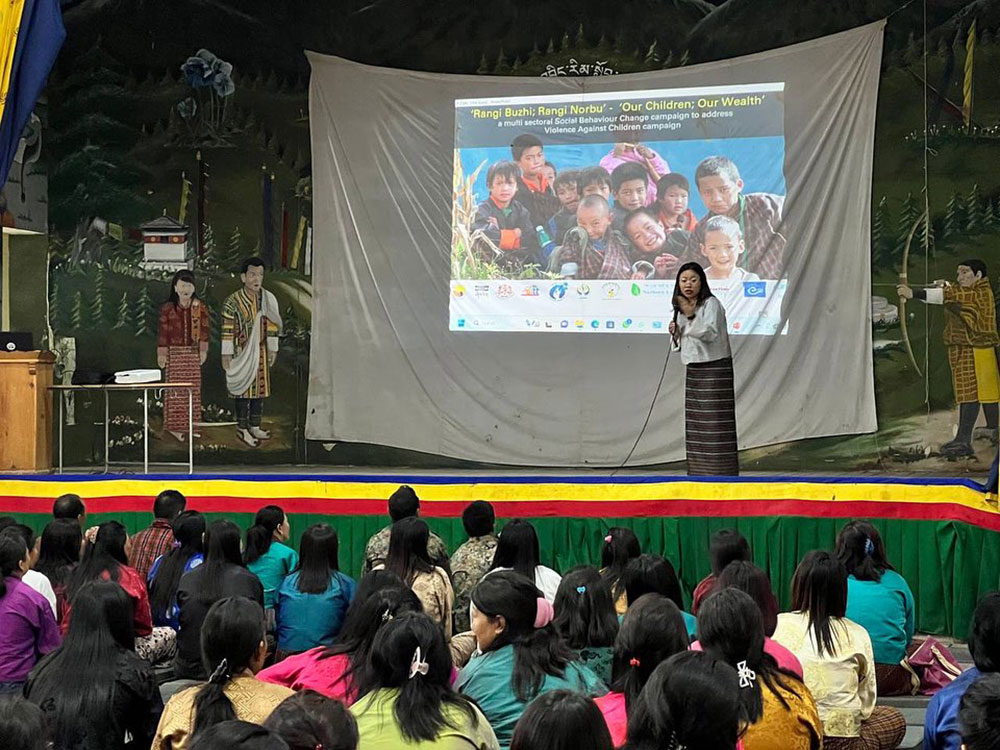Sherab Lhamo
In the past four and a half years until 2022, disturbing data from Nazhoen Lamtoen and Respect, Educate, Nurture, and Empower Women (RENEW) reveal that every 42 hours, a child or young person in Bhutan experienced violence—alarming statistics, underscoring the urgent need for intervention.
More than 67 percent of this violence was directed towards girls. Sexual violence tops the list at 90.3 percent against females and 9.7 percent against males, followed by exploitation with 71.4 percent affecting females and 28.6 percent affecting males.
Highlighting the gravity of the situation, His Majesty The King of Bhutan noted: “A nation cannot fool into thinking of a wise future if we have not invested wisely in her children.”
In a proactive stance against child violence, RENEW, in collaboration with Shaba High School, Drugyel Lower Secondary School, and Betika Middle Secondary School, initiated the programme “Rang Ghi Buzhi, Rang Ghi Norbu” or “Our Children, Our Wealth.”
Operating during parent-teacher meetings in Paro schools since September, RENEW community service centers organised a half-day program aimed at enlightening parents about various forms of violence and arming them with the knowledge and skills to respond effectively.
The programme attracted female homemakers, many of whom were illiterate, with a sparse representation of literate males at Shaba school. Overall, around 500 participants attended, shedding light on the pressing need for widespread awareness.
RENEW extends its efforts beyond schools, conducting “End violence against children” programmes in diverse community groups, including teachers, Early Childhood Care and Development trainees at Paro College of Education, local leaders, and parents—a preventive strategy to curb violence at its roots.
RENEW’s Center Manager, Anu Rai highlighted that the programme delved into the intricacies of various types of violence, aligning with Bhutan’s Domestic Violence Prevention Act of 2013.
The initiative addressed physical, emotional, sexual, economic, neglect, and online violence.
Moving forward, RENEW envisions rolling out parenting education programs in collaboration with the education sector, extending its reach to other school districts.
Participants received vital information on recognising signs and symptoms of violence. Physical violence indicators included injuries to animals, bullying, unexplained bruises, and abnormal behavior expressions. Emotional abuse signs encompassed slow development and poor self-esteem, while sexual violence signs involved medical issues and isolation.
During the programme, powerful videos depicting different types of violence in dzongkhags were shared, along with statistics and pictorial representations. Parents were guided on responding to violence, emphasising speaking up, standing up for their child, reporting incidents, and seeking support.
To report violence cases against children, toll-free numbers to the nearest service providers were provided: police (113), Nazhoen Lamtoen (1257), The Pema Secretariat (1098), and RENEW (17126353).
RENEW is actively collaborating with local leaders to raise awareness about violence against children, gender-based violence, domestic violence, and sexual reproductive health and rights in rural areas.
Amidst expressions of gratitude from parents, who eagerly advocated for more parenting education programmes, Anu concluded the programme on a hopeful note, signalling the importance of collective efforts in safeguarding the well-being of Bhutan’s children.


